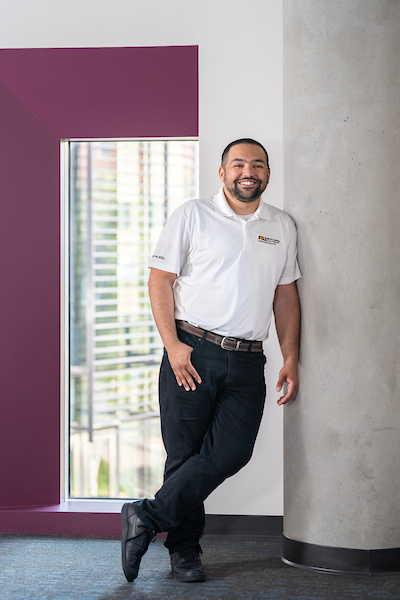
>> Executive Connections Stories
Discovering your potential: An interview with alum Giovanni Pieve

Giovanni Pieve
For Giovanni Pieve (Full-time MBA ’22), the W. P. Carey Full-time MBA program was an opportunity to develop the skills needed to launch a career in sports business. The benefits went far beyond technical skills, including priceless interactions with executive mentors in the Executive Connections program.
“I think when you combine the expanse of industries that are represented and the experience that’s represented with the fact that they really care and want you to succeed, that’s unique,” he says.
Pieve, who currently works as a Senior Sourcing Analyst at NASCAR, sat down with W. P. Carey to discuss the impact the MBA program had on his career journey, his continued connections with classmates, faculty, and mentors, and what he learned during his time at ASU.
Q&A with Giovanni Pieve
What is it that makes Executive Connections so unique and impactful? Mentors, alumni, and current students know best. This conversation has been edited and condensed.
Question: What led you to pursue an MBA at W. P. Carey?
Answer: I was an English teacher in South Korea, and I was deciding on what I wanted to do when I came back to the States. I knew that I wanted to get into sports business and be in the business world, but I wasn’t really prepared for it. My undergraduate degree was in science with a minor in teaching, which is how I got into teaching English. But that wasn’t relevant experience I could transfer. So I was looking at programs and saw the MBA, and it seemed like a really great fit for me. I was already a Sun Devil, so now I’m a Double Devil. It was just the right fit and a place I could build a foundation of skills for the business world.
Q: How did your MBA experience, including your internship, influence your career path and where you are now?
A: The first, easy answer is that a lot of the technical stuff I learned really helped me and is helping me now at work. But beyond that, I think the MBA helped me grow as a person. It helped me become somebody who is able to put myself out there more. I’m able to better build relationships. Before, I thought I was good at it. But the MBA program taught me how to network, how to build relationships, and how to work with people. I think that’s what has gotten me as far as I am today. All the technical stuff, that helped. But really, it just made me a more well-rounded individual.
My internship was with the NASCAR Diversity Internship program. I worked in procurement for them, and the connections I made there were incredible. Everybody in NASCAR was so amazing. After I finished the internship and my second year of my MBA, there weren’t any positions available for me in the areas I wanted to be in. I took a different job at another great company. At a certain point, my former, and now current, boss from NASCAR called me up and said, “Hey, we have an opening.” She asked me if I wanted the job, and I said, yes, it’s where I wanted to be. That shows the importance of the program, right? In the internship, I built those connections, I worked well. Even though it didn’t immediately lead to a job, those connections remembered me, and they called me a year later saying, “We have something for you and it would be a good fit.”
Q: How did the Executive Connections program help you develop your leadership skills?
A: Executive Connections was very helpful with that. I spoke with my mentor about how I had issues with taking the lead and putting myself out there. He worked with me and helped me to overcome those issues. He helped me work on messages reaching out to people. It helped me gain confidence, and over time, it became easier. The other mentors, when we had program-wide events and meetings, also gave me good advice. They allowed me to work through my imposter syndrome and work away from the idea that I shouldn’t be here. They were able to instill in me that, yes, I do belong here, I’ve earned this, and I should be here. That in itself helped me put myself out there more.
Q: What was something you learned during the MBA program that surprised you and stuck with you?
A: There was a lot that I learned that changed my perspective on things because I was coming from a non-business background. I was in a career transition. I learned how the business world works and just how important building relationships and connections is for your success. Having a great transcript and having all the grades is not really enough. You have to put yourself out there. You have to speak to people and let them know who you are. You have to sell the best version of yourself and be that best version of yourself. I think that wasn’t exactly surprising to me, but in my previous experiences, I didn’t have to do that to that extent. So learning that was new for me and really helped me.
Q: How have you grown as an individual and a professional since the MBA program?
A: I was a lot more of a timid person, which I know might sound odd. Like, “He lived in South Korea, how could he be a timid person when he moved abroad?” But I was definitely less confident, more timid, and I didn’t have the technical skills you need to enter the business workforce. The program didn’t just show me how to do things, but it showed me my potential and what I could become, what I could learn, and what I could do. I think that, in and of itself, changes your mindset and changes how you approach things.
My goal was to enter the sports business world, and pre-MBA, part of me wasn’t sure if I could really do that. It seemed impossible, but the MBA made it possible. It taught me how to make it possible. I think that’s what really makes it life-changing. Now I’m working for one of the biggest sporting organizations in the country, and that’s something I had never thought could happen before.
Q: How have the connections you made during the program with classmates and faculty made an impact on you?
A: The connections that I made here, I feel are going to last a lifetime. First and foremost, I have a lot of friends that I made out of this program. Now we’re scattered all over the country, but we still talk. I still see them on social media, and the ones who are here in Arizona still hang out. I know that in the future, if need be, I can lean on them to help me out. If I’m in that situation, I would gladly do the same for them. If I see a job posting and think, “So-and-so would be a really good fit for this,” I send it to them. I say, “I know you’re not looking, but just in case, check this out.” I think that’s really important.
I had some really great professors here. I see them on LinkedIn, and when you post about a job and you see they congratulate you, it’s a great feeling. You can see that they still care about you and are looking out for you. I know that if I reached out to a professor if I needed help they would help me, even as an alumni a year and a half removed from the program.
I think there’s also the connection to myself. I learned a lot about myself and my potential and what I could become. It’s made me feel better about myself and where I’m at in life.
Q: What advice would you give a student who is considering the Full-time MBA at W. P. Carey?
A: If you’re looking for a place to build a foundation for the business world and a place to hone your skills and become more well-rounded, this is the place for you. I would say just do it, and join the program. It’s well worth it. It’s not an exaggeration to say it’s been life-changing for me. If you’re looking to become a leader and a well-rounded person in the business world, this is the place to be.
I would also say do more research into what you want to do, but also widen that scope a bit. I wanted to do sports, but I also knew that might not happen immediately. So don’t pigeonhole yourself. At the same time, make sure you’re on track for something you want. You have to find that balance. I found it a bit late in my second year. I wish earlier on, I had opened myself up to more opportunities instead of closing the door on some things because I thought, “I want this one specific thing.”